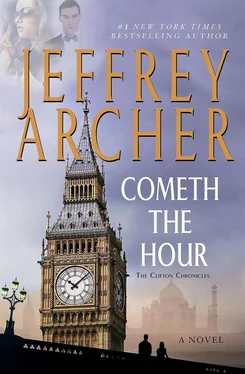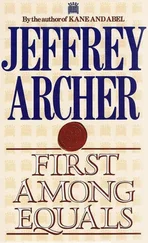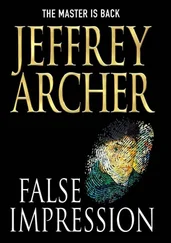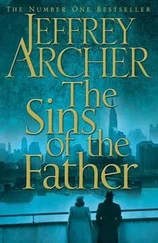“Forty, possibly forty-five, elegant, married—”
“How do you know she was married?”
“She was wearing a wedding ring and an engagement ring.”
“What does that prove?”
“That’s she’s not available. You, for example, are recently divorced.”
“What makes you say that?”
“There’s a thin white line on the third finger of your left hand, which you occasionally try to twist around, as if a ring were still there.”
“What was she wearing?”
“A tailored suit, no other jewelry except an expensive pair of diamond earrings and a Cartier Tank watch.”
“Did you talk to her?”
“No, her body language made it clear she didn’t want to be disturbed.”
“Did you speak to any of the other passengers on the flight?”
“No, I’d had a pointless and exhausting journey to Lagos and I just wanted to sleep.”
“I’ll need the flight number and the date and time of the booking because it’s just possible she’s a regular on that route.”
Arnold made a note.
“It couldn’t have been her,” said Hakim with conviction.
“Do you remember anything else about her?”
“She was reading Watership Down and she wore glasses.”
“Her nationality?”
“Scandinavian. Swedish would be my guess.”
“What makes you say that?”
“No other race on earth has such naturally fair hair.”
“Now I want you to think carefully before you answer my next question, Mr. Bishara.” Hakim nodded. “Can you think of anyone who would benefit from your being in jail?”
“Not that I’m aware of. A lot of people are envious of my success, but I don’t regard them as enemies.”
“Is there anybody who would be happy to see the proposed Farthings Kaufman merger fail?”
“Several people. But after what I’ve been through in the last few days, I’m not willing to accuse someone who, like me, might be totally innocent.”
Arnold made another note.
“Mr. Clifton or Mr. Kaufman, for example? Don’t forget they were at school together. One of them may see himself as the next chairman, and sooner than expected if you were safely out of the way.”
“There’s no doubt that one of them will eventually take my place as chairman. But I can assure you, Mr. Hammond, they are both one hundred percent trustworthy and have more than proved their loyalty over the past few days. No, Mr. Hammond, you’ll have to look further afield than that.”
“What about any other board members?”
“They’re either too old, too busy, or well aware that they’re not up to the job.”
Arnold Hardcastle allowed himself a smile.
“Well, there’s someone out there who wants to see you locked up for a very long time, otherwise why take so much trouble to have you arrested for a crime you didn’t commit?”
“But if someone like that had been on the plane, surely I would have recognized them.”
“They wouldn’t have been on the plane,” said Hammond. “He or she would have used someone who was above suspicion, who could get on board that flight with thirteen ounces of heroin without anyone suspecting them. A stewardess perhaps, or even the pilot.”
“But why?” said Hakim.
“Greed or fear is usually the answer to that question, Mr. Bishara. Money is almost always the catalyst. Some debt they needed to pay, some piece of information they didn’t want revealed. Don’t worry, Mr. Bishara, I’ll find out who it was. But it won’t come cheap.”
Hakim nodded. The mention of money and he felt on firmer ground. “What’s it going to cost me?”
“I’ll need a small team. Two, possibly three. They’ll have to be experts in their fields, and they’ll expect to be paid in cash, up front.”
“How much?”
“Five grand.”
“You’ll have it later today,” said Hakim, who nodded to Arnold. “And your payment, Mr. Hammond?”
“I’ve given that some thought, and I’d prefer to be paid on results.”
“What did you have in mind?” asked Hakim, remembering another of his father’s golden rules: in any deal, always wait for the other side to make the opening bid.
“Five thousand pounds if I find the person responsible for planting the heroin. Ten thousand if they’re arrested and charged. Twenty thousand if I discover the person or persons behind the operation. And another thousand for every year of their sentence.”
Hakim could have bargained for an hour and probably lowered Hammond’s demands by 30, 40 even 50 percent, but as his father had once told him, sometimes the opening bid is the one you should settle for, especially if the stakes are high. In this case, the stakes couldn’t have been higher.
He rose slowly from his chair, offered an outstretched hand and said, “You have a deal, Mr. Hammond.”
“This emergency board meeting has been called in most unfortunate circumstances,” said Ross Buchanan. “But first I must tell you that Mr. Bishara has asked me to stand in as chairman until he returns.”
“Shouldn’t that be put to a vote?” said Adrian Sloane. “Can a man who’s locked up in prison on a serious drugs charge continue to dictate how a public company is run?”
“I agree with Mr. Sloane,” said Giles. “Such an important decision should be put to a vote. I therefore propose that Mr. Ross Buchanan, a distinguished former chairman of this bank, takes on the responsibilities of chairing the board once again, until Mr. Bishara returns to his rightful position.”
“But I am also a past chairman of the bank,” protested Sloane.
“I did say distinguished,” said Giles, without even bothering to look at Sloane.
A stony silence followed.
“Will anyone second Mr. Clifton’s proposal that Mr. Ross Buchanan stand in as chairman until Mr. Bishara returns?” asked the company secretary.
“I will be delighted to do so,” said Jimmy Goldsmith.
“Those in favor?” asked the company secretary.
Everyone around the table except Sloane raised their hand.
“Those against?”
Sloane raised his hand and said, “I want it minuted that if Bishara is convicted of drug smuggling, I shall expect every one of you to resign.”
“And if he isn’t?” asked Victor Kaufman.
“Then naturally I will have to consider my own position.”
“That’s something else I’d like minuted,” said Victor. The company secretary duly wrote down his words.
“Perhaps,” said Ross, “we should now move on. I’d like to begin by welcoming Lord Barrington and Mr. James Goldsmith as members of the board, before asking our chief executive, Sebastian Clifton, to report on the effect recent events have had on the company’s finances, and the latest position concerning the merger.”
“Our shares are down by twelve percent, Mr. Chairman,” said Sebastian, “but I’m pleased to report that the market appears to have steadied, not least because of the intervention of Mr. Goldsmith, who clearly not only believes in Mr. Bishara’s innocence but also in the long-term future of the bank. And can I say how delighted I am that he has taken his place on the board and been able to join us today.”
“But like Mr. Buchanan,” said Goldsmith, “I intend to withdraw as a director as soon as Mr. Bishara returns.”
“And if he doesn’t return?” said Sloane. “What will you do then, Mr. Goldsmith?”
“I will remain on the board and do everything in my power to make sure that a little shit like you doesn’t become chairman.”
“Mr. Chairman,” protested Sloane. “This is the board meeting of a leading City bank, not a casino, where clearly Mr. Goldsmith would be more at home.”
“My reason for not wanting Mr. Sloane to return as chairman of this bank,” said Goldsmith, “is not just because he’s a shit but, far more important, because the last time he held that position he almost succeeded in bringing Farthings to its knees, and I suspect that is his present purpose.”
Читать дальше












